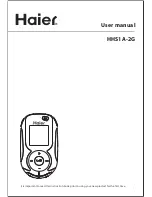
Fitness Modes—Walk Fitness and Jog Fitness
BF-1 Owner’s Manual
33
What is ‘Effective’ Aerobic Exercise?
Aerobic exercise, such as walking and jogging, builds up your
cardiopulmonary functions and increases your stamina. Since
stamina is a good measure of physical age, regular and continuous
aerobic exercise can make your body more youthful.
Aerobic exercise is also very effective for losing weight. Oxygen brought into
body breaks down and burns off fat. Moreover, as your exercising builds muscle
mass and increases basal metabolism, your whole body and constitution loses
more and more fat.
To achieve the maximum benefits of aerobic exercise, you should avoid merely
jogging in any haphazard fashion, but be careful to set appropriate exercise
intensity levels (i.e., the pace for walking/jogging) and exercise lengths.
Exercise intensity and heart rate
As you exercise, your heart rate rises. Since intense exercise increases your
heart rate more significantly than light exercise, heart rate is a reliable indicator
for exercise intensity. To achieve the desired effect of your exercise, it is
important that you determine the target heart rate in advance and try to bring
your heart rate up to this target during exercise.
How can you determine the proper target heart rate? There are various methods
for calculating heart rate, but the BF-1 adopts a method using %HRR
(percentage of heart rate reserve). The %HRR figure assumes your resting heart
rate as 0% and your maximum heart rate (heart rate during your most intense
exercise) as 100%. For walking, a %HRR figure of 55 – 75% is optimal for aerobic
exercise. For jogging, 65 – 75% is optimal. For the specific formula used to
calculate your optimum target heart rate, see
n
The BF-1 calculates your heart rate according to the blood flow at your ear lobe detected by the
included pulse sensor.
Using the Fitness modes, you can maintain the optimal heart rate during exercise
without the need to be continually conscious of your heart rate, simply by
entering your resting heart rate and maximum heart rate figures in advance.
When your heart rate dips below the optimal level, faster songs are played to
naturally prompt you to increase your pace; likewise, when your heart rate
exceeds the optimal level, slower songs are played to prompt you to decrease
your pace. Thanks to this feature, you simply match your walking/jogging pace to
the tempo of the music, and your optimal heart rate is maintained (refer to the
graph below). You can also easily check whether your heart rate is optimal or not
from the LED. When it is optimal (%HRR is 55 – 75%), it flashes in green. When
lower than optimal, it flashes in blue. When higher than optimal, it flashes in red.
Continue to
next page
F Y I
















































